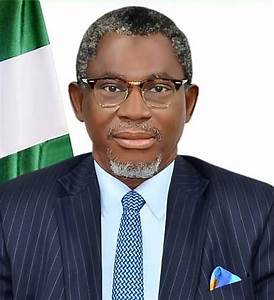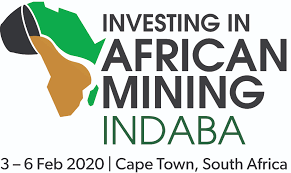During a lively webinar focused on building Nigeria’s mining industry through downstream opportunities, the audience heard that the fall-out of the COVID-19 pandemic has leveled the playing field in the market, that buying “Made in Nigeria” should be encouraged and the Minister of Mines and Steel Development, Architect Olamilekan Adegbite, invited investors to participate in the downstream sector.
The webinar was the first in a series in the run-up to the annual Nigeria Mining Week that is taking place from 12-16 October. Last week it was announced that this year’s edition will be a digital platform and that the live event will return to Abuja in October next year. The webinars are hosted in collaboration with media partner Mining Review Africa.
Government will provide infrastructure
In his official opening statement at the start of the webinar, Minister Adegbite said “the COVID-19 pandemic restricts movement across borders and we need to accelerate our plans for economic investigation, employment and revenue generation for the country.”
He added that work had been ongoing on the downstream policy having gone through stakeholders engagement and waiting for the final approval from the Federal Executive Council. “The policy strengthens the regime for beneficiation locally: that is to stop exportation of raw minerals from Nigeria. So to this end, government is providing infrastructure to encourage investors to come into Nigeria to participate in the downstream opportunities. Government will provide road, rail and water transportation infrastructure and at the same time provide energy at certain clusters, which have been created for this purpose.”

The President of the Miners Association of Nigeria (MAN), Alhaji. Kabir Mohammed Kankara, said the COVID-19 pandemic had taught humanity of this generation that only the basic essential necessities of live are essential for human existence and wellbeing.
“The role of mining in providing these basic necessities cannot be overemphasised,” said Alhaji Kankara. “Besides, the provision of jobs and generating revenue for the government coffers, mining products are essential in ingredients of food, drugs and pharmaceutical industries. Therefore, developing the downstream opportunities in the downstream sector will not only provide the building blocks for the mining industry, it will also help to rebuild the nation by ways of massive job creation, reduction in crime rate, developing other cottage industries and growing the GDP in an atmosphere of peace and security.”
“If there is any benefit offered by this global pandemic it is the window of opportunity to commence the systemic implementation of policies and regulations that have been accumulated on our books over the years. Enough of these rhetorics. It is time that our engagement and related discussions and talks for pragmatic actions that will deliver the mining industry of our dreams. A sector that will take Nigeria out of the woods of a mono economy.”
The live webinar panel comprised:
Moderator: Habeeb Jaiyeola, PwC Nigeria, Associate Director, responsible for the public sector; Dr. Garba Abdulrasaq, Director General, Nigeria Geological Survey Agency, Nigeria; Josephine Emotan Aburime-Shine, CEO, Emotan Global Ventures, Nigeria; David Turvey, Managing Director, Kogi Iron, Nigeria; Mary Iwelumo, PwC Government & Public Sector Lead and Head Strategy, Nigeria.
The panel discussed how Nigeria could improve investment into the sector through increased beneficiation opportunities, encouraging local transformation and boosting local market and job opportunities through local beneficiation and developing the Made in Nigeria brand.
“The government should discourage the export of raw materials by increasing the taxes” said Emotan Global Ventures’ Josephine Aburime-Shine, explaining: “we have become famous for exporting our raw materials at extremely low prices and then importing it again at very high costs after being processed. When I started to explore this industry, I wondered why Nigeria was not showing up as a centre for gemstones. Especially as I became more aware of all the metals and minerals that are actually here and are being exported.”
Using Thailand as an example, she said the Nigerian government should discourage the export of raw materials by increasing the taxes while reducing the taxes on processed materials.
Building a Buy Nigerian brand
“It has to be made easy for people to buy Nigerian products” said PwC’s Mary Iwelumo. “The result of the lack of beneficiation means that a lot of money leaves the country and in order to build a Buy Nigerian brand, you have to be able to give value and it has to make commercial sense. So what would encourage people to spend their money in Nigeria? Quality, exit options, after sales service and a trusted second hard market.”
“In terms of branding our product, I just know that the brand value associated with any item comes with time. So this is definitely not a sprint, it’s something that we need to focus on, we need to be diligent and dogged about. Nigerians are known to be resourceful and produce results.”
Ms Iwelumo also emphasised that the COVID-19 pandemic had created an opportunity for Nigeria’s mining sector: “we’re in a pandemic, we’re in a crisis. The jig would be on us if we do not take advantage of the opportunity this has opened up. COVID-19 is a crisis beyond the healthcare space. It has levelled the market playing field, everyone is dealing with similar issues, and our indigenous players can take advantage of that. If we can leverage that around quality assurance, convenience, understanding what we have and knowing the value.”
There are some good signs
“Kogi Iron is in the thick of the value added chain business in that we have an iron ore processor and we are looking at building a steel plant,” said David Turvey, MD of Kogi Iron in Nigeria. “That steel plant is directed towards replacing imports the country currently has in steel. It is a very important project, not an export project initially, but to service and help the industrialisation of Nigeria.”
Asked what steps he would advise to on creating a beneficiation industry, Mr Turvey replied: “it does relate to attractive and efficient policies, they’re important. Your security in tenure, your assets are very important. Effective and available infrastructure is critical in any value added processing, because it does reflect on the cost structure of the overall business of the mining industry. The one important thing that is often missed is really the quality control and quality assurance systems that you need right from exploring through to the mining of a mineral to the beneficiation of the mineral to enable you to get a quality product when you do the value adding. Unless you have that value chain all the way through, you will never produce at a quality level.”
“Nigeria is in its early stages but there are some good signs. There’s political stability, there’s will and some of the administrative and data systems have been improved. Where it needs to go now is those data systems need to be applied and focused on minerals that are critical for your country internally and also critical to beneficiate for export dollars.”
Opinion poll
During the webinar the some 300 participants were asked to take part in an opinion poll on that they thought the biggest impact would be on the development of the downsteam sector of the Nigerian ministry. The results were as follows:
– Improvement in infrastructure: 36%
– Review of policies and regulations: 19%
– Incentives to drive investments: 31%
– Human capacity development: 14%
“We need to find our own solutions”
The issue of quality control and testing as well as the technology for that also formed part of the discussions and the CEO of Emotan Global Ventures was able to give practical examples.
“A lot of equipment is imported and not always affordable for our local miners. That doesn’t mean that we cannot come up with our own solutions. We were making jewellery centuries ago, gold is not a new material for Africa. We need to find our own testing solutions from our own scientists.”
Josephine continued: “we need to take charge of what we have ourselves and realise how processing can affect the value. Sometimes a simple washing of the stones can make a big difference and change the value. Why are we losing a lot of revenue into the country because we are not getting the value and taxes for what we are exporting out because we are exporting it in a very raw state, without separation, without any kind of processing. Whereas if we are able to train and educate the locals to sort it out and identify the stones into the various categories of prices. That will make a huge difference.”
“These are all things that we have to start to understand if we want to change this industry. I encourage my local miners because I believe that the artisanal miners have kept the Nigerian mining industry going. These people work so hard and it sometimes saddens me that they get the least benefit from the hard work and labour.”
Government’s role
“The Government’s position on the downstream sector is that if you look at the Nigerian Roadmap it is stated clearly that there is a need for us to encourage development or beneficiation of our mineral products,” said Dr Garba Abdulrasaq, Director General, Nigeria Geological Survey Agency.
“We need especially our local industry to use the minerals, develop them to create employment, to generate revenue and also to encourage the development of orders in the downstream and sidestream industry. Now building this downstream sector, through the development of local industries, requires sustainability. What this connodes is the interdependence of the mining eco system upstream, midstream and downstream and sidestream for the survival of the industry. The ministry and this agency trigger the industry value chain by identifying, locating and exploring the country’s minerals to determine their quantity and quality and this is pivotal for any mineral value chain. So, the government, apart from trying to institute policies, is also driving the development of some of these minerals to support the system.”
Increase mining contribution to GDP to 5%
Nigeria’s Minister of State in the Ministry of Mines & Steel Development the Hon. Dr. Uchechukwu Ogah delivered the closing address for the webinar. His comments included that the Ministry of Mines and Steel Development was created by the current administration for the diversification of the economy, industrialisation, poverty reduction and job creation.
“Most importantly,” Dr Ogah said, “to ensure that there is value added to minerals for export. Solid minerals contribute about 2.5% of GDP and currently we are looking at how we can increase it to 5% by the year 2025. We are actively focusing on a number of policy initiatives. These include the development of key strategic minerals such as gold, barite, coal, lead, zinc, iron, bitumen and limestone. We are also currently working on the formalisation of artisanal and small-scale miners.”






